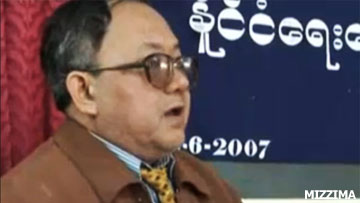New Delhi (Mizzima) – Since June 9, fighting has broken out between the Kachin Independence Army (KIA), the armed wing of Kachin Independence Organization (KIO), and Burmese government troops. The United Nationalities Federal Council (UNFC) is made up of cease-fire and non- ceasefire ethnic armed groups. The alliance’s six dedicated member organizations are the Karen National Union (KNU), New Mon State Party (NMSP), Chin National Front (CNF), Kachin Independence Organization (KIO), Karenni National Progressive Party (KNPP) and the Shan State Progressive Party (SSPP).

One of the UNFC policies is to cooperate in defending against any attacks by Burmese government troops against the ethnic groups. Mizzima reporter Tun Tun talked with Pa-O National Liberation Organization (a member of the UNFC) chairman Khun Okkar about the possibility of UNFC members taking part in the fighting against government troops, and the role of the pro-democracy groups in Burma.
Question: The KIO is a member of the UNFC, which says that if government troops launch an attack against any group member, other members will help defend them. Will the UNFC help the KIO?
Answer: A UNFC policy says that if the government attacks one member other members must think that all are under attack and support the UNFC central committee. So, the UNFC central committee needs to urgently hold a meeting and decide, and then all members will follow the resolution. I think a meeting will be held very soon. As soon as a resolution is made, we are ready to follow the resolution.
Q: If the KIO is defeated by government troops in the current armed conflict, what potential adverse consequences await the groups in the alliance?
A: Since February, the KIO has sought an alliance with the non-ceasefire groups such as the KNPP, KNU and Chin ethnic armed groups. We agreed to cooperate in defending against any attack by the government. But, before we had made preparations, we announced that if the government attacked any group, they would face armed conflict with all members of the Federal Council across the country. In response, I think the government army decided to show that they are very powerful and stronger, so they launched this attack.
Other allies such as the KNU and KNPP are fighting against the government in their areas. We will continue fighting. It’s likely that we may face more fighting. I think the government troops are carrying out a test of their strength to determine its abilities in these areas.
Question: Some criticize that despite many allies, your alliance is not effective. How do you respond to that?
A: I think we need to prove that criticism is wrong. We made a resolution to join our forces in support of each other and we will follow the resolution. But, the KIO itself has fought against government troops only in some areas, and it has used a limited number of its troops–that shows that they don’t want the fighting to spread, so I can’t say exactly what the UNFC committee will decide.
Q: What are other difficulties that the UNFC faces now?
A: We have a plan to form a Federal army, and we have done some preparation. But, we have not done enough, and the fighting started early. Anyway, I want to say that we will follow our original plan.
Q: Do you think that other cease-fire groups will take part in the fighting against government troops, if the UNFC creates more fronts?
A: In our alliance, there are three cease-fire groups, the Mon armed group, KIO and SSPP. Two out of the three groups are fighting against the government troops. In the cease-fire groups, only the Mon group has not fought. But, there is growing tension in their area, too. So, the Mon group has also prepared. All are waiting for the resolution.
Q: Ethnic armed groups are fighting for racial equality, self- determination and democratic rights. What should be the role played by the pro-democracy groups in Burma?
A: The pro-democracy groups in Burma should clearly understand that only asking for democracy cannot create peace in Burma. Only transforming the military dictatorship into a democratic system can not bring about peace. Unlike the successful transitions in Indonesia and the Philippine, our country has a different tradition. So in our case, just moving from military dictatorship into a pseudo-democratic system cannot establish peace.
During the transition to democracy, our country needs to build a genuine federal union and establish racial equality to achieve peace. Democracy alone cannot bring about peace. So, the pro-democracy groups need to study this more. I want them to urge the government led by (President) Thein Sein not only to establish democracy in Burma but also to form a genuine federal union.



